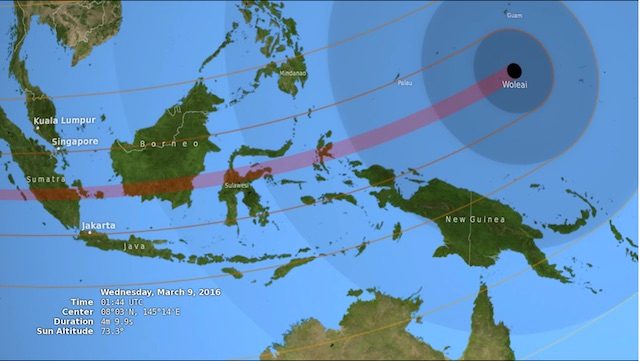SUMMARY
This is AI generated summarization, which may have errors. For context, always refer to the full article.

Livestream courtesy of Slooh
MANILA, Philippines (UPDATED) – The lone total solar eclipse for 2016 occurs Wednesday, March 9, and will be seen across large parts of Indonesia and the Pacific Ocean.
A solar eclipse occurs when the Moon passes directly between the Earth and the Sun. As seen from Earth, the moon is just broad enough to cover the solar face, creating a breath-taking silver halo in an indigo sky. For many astronomers it is the ultimate experience.
The last total solar eclipse occurred on March 20, 2015, only visible from the Faroe Islands and Norway’s Arctic Svalbard archipelago.
The total eclipse sweeps across 12 of Indonesia’s 34 provinces, which stretches about 3,000 miles (5,000 kilometres) from east to west, before heading across the Pacific Ocean.
Partial eclipses will be visible in northern Australia and parts of Southeast Asia, including southern parts of the Philippines.
The moon began moving across the sun on Indonesia’s main western island of Sumatra at around 6:20 am (2320 GMT Tuesday), before the eclipse sweeps across Sulawesi and Borneo, then moves over the Malukus and heads out into the ocean.
Thousands of locals, tourists, and scientists are flocking to Indonesia to witness the event.
Rappler streamed the eclipse live. The livestream starting at 23:00 UTC Tuesday, March 8 / 7am GMT+8 Wednesday Manila time / 6am GMT+7 Jakarta time (for local times elsewhere, view this link).
The stream was provided by Slooh Community Observatory. You can also go to Slooh.com to join and watch this live broadcast, snap and share your own photos during the event, chat with audience members and interact with the hosts, and personally control Slooh’s telescopes.
Meanwhile, for eclipse watching, a warning: do not even attempt to look directly at the eclipse with your naked eyes – it is dangerous and can cause permanent eye damage, even blindness.
You can read more tips for safe eclipse viewing at the NASA Eclipse website. – With Agence France-Presse / Rappler.com
Add a comment
How does this make you feel?
There are no comments yet. Add your comment to start the conversation.